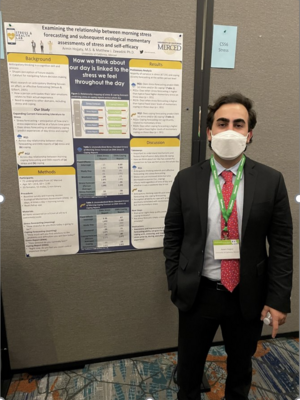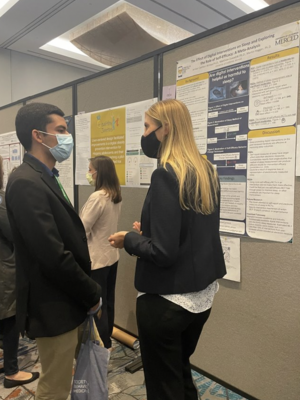Poster by Armin Hojaity

Anticipatory thinking is a cognitive skill and process that shapes a person's perception of the future, and is a catalyst for later decision-making. Much of the research on anticipatory thinking has been focused in the domain of affect. Armin's paper further expands the literature into the domain of stress by using concepts derived from anticipatory thinking, like stress forecasting and coping forecasting, to show that how a person thinks about their day is linked to the stress they feel throughout the day. Armin's paper found that on days when stress forecasting is higher than typical, higher momentary stress and lower levels of momentary coping is reported on those days. Also, on days when coping forecasting is higher than typical, higher levels of momentary coping is reported on those days. Findings suggest that anticipatory thinking extends into stress and coping domains, and that forecasting is not just linked to increased stress, but also a perception of decreased resources to cope with said stress.
Hojjaty, A., & Zawadzki, M. J. (2022, April 6-9). Examining the relationship between morning stress forecasting and subsequent ecological momentary assessments of stress [Poster presentation]. https://www.sbm.org/UserFiles/file/SBM2022PocketProgram_Final.pdf
Poster by Amber Arroyo

Digital interventions delivered through websites and smartphone apps are an increasingly prevalent tool to address inadequate sleep, although there is inconclusive evidence on their efficacy. The current meta-analysis aimed to determine the effect of digital interventions on sleep outcomes. Sleep-promoting digital interventions had moderate-to-large effects on sleep outcomes with significant variability across studies. The most commonly used self-efficacy BCT across digital intervention programs for sleep were instruction on how to perform the behavior, problem solving, and behavioral practice/rehearsal. Yet, the number of self-efficacy BCTs did not moderate the effect of digital interventions on sleep.
Arroyo, A. C., Zawadzki, M. J., & Hagger, M. S. (2022, April 6-9). The effect of digital interventions on sleep and exploring the role of self-efficacy: A meta-analysis [Poster presentation]. Society for Behavioral Medicine 43rd Annual Meeting. https://www.sbm.org/UserFiles/file/SBM2022PocketProgram_Final.pdf

